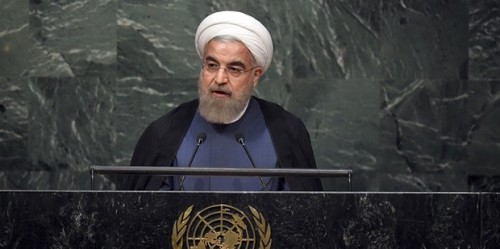PHOTO: President Rouhani Addresses UN General Assembly on Monday
In sharp contrast to the days of Mahmoud Ahmadinejad, whose speeches to the UN General Assembly guaranteed headlines, Monday’s address by Iran’s President Rouhani drew little attention.
Yet, in a less flamboyant way, Rouhani’s speech was just as striking. Forget Ahmadinejad’s grand statements from Holocaust denial to the US Government’s 9-11 conspiracy to the Islamic Republic ruling the world. Put to the side the historic nuclear agreement between Iran and the 5+1 Powers.
Monday’s address began with Tehran’s new priority — confrontation of Saudi Arabia, using the catalyst of last week’s Mecca stampede that killed at least 765 people, including 226 Iranians with another 248 still missing:
Public opinion demands that Saudi authorities discharge, without delay, their international responsibility in providing immediate consular access for the quick identification and returning of the bodies.
It is also required that the necessary conditions be provided for [conducting] an independent and precise inquiry into the causes of the disaster and [working out] methods for preventing a repeat of that in the future.
Later in the speech, Rouhani hailed the July 14 nuclear deal as the herald of a “new era” and he again promoted his symbolic WAVE (World Against Violent Extremism).
However, even these were brought back to Iran’s increasingly-tense relationship with Riyadh. Rouhani’s invocation that the nuclear agreement should lead to “positive outcomes regarding the establishment of sustainable peace and stability in the region” returned to regional crises involving Iran and Saudi Arabia, from Syria to Yemen to Bahrain to Iraq.
The President offered little substance about those regional issues, merely asserting, “As we aided the establishment of democracy in Iraq and Afghanistan, we are prepared to help bring about democracy in Syria and also Yemen.”
However, his speech follows five days of high-profile attacks on Saudi Arabia, compounding the long-standing disputes between the Islamic Republic and Riyadh. The Supreme Leader has led the denunciation of Saudi mismanagement and negligence, demanding an apology. Politicians and clerics have called for supervison of the hajj pilgrimage to be stripped from Saudi Arabia and given to the Organization of Islamic Cooperation. The outlet of the Revolutionary Guards has blamed the Saudi Deputy Crown Prince for the tragedy, while military commanders have suggested that the disaster was an Israeli-Saudi plot.
See Iran Daily, Sept 27: Supreme Leader “Saudis Must Apologize for Mecca Disaster”
Iran Daily, Sept 26: Tehran Maintains Pressure on Saudi Arabia Over Mecca Disaster
More demonstrations of anger and sorrow are likely on Tuesday as the first bodies of the Iranian victims of the stampede arrive in Tehran. President Rouhani cut short his New York trip to fly home late Monday so he could attend today’s funerals.
Meanwhile, Health Minister Hassan Hashemi has finally left for Jeddah in Saudi Arabia to review the conditions of injured Iranian pilgrims.
The minister’s visit had been scheduled for Monday at noon, but it was postponed because of Saudi Arabia’s failure to grant a flight permit.

